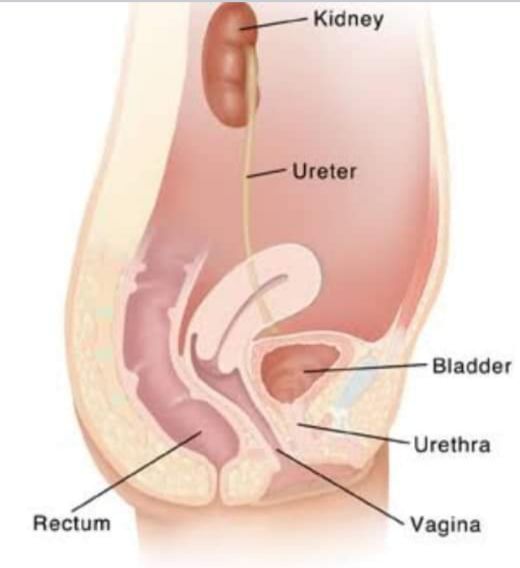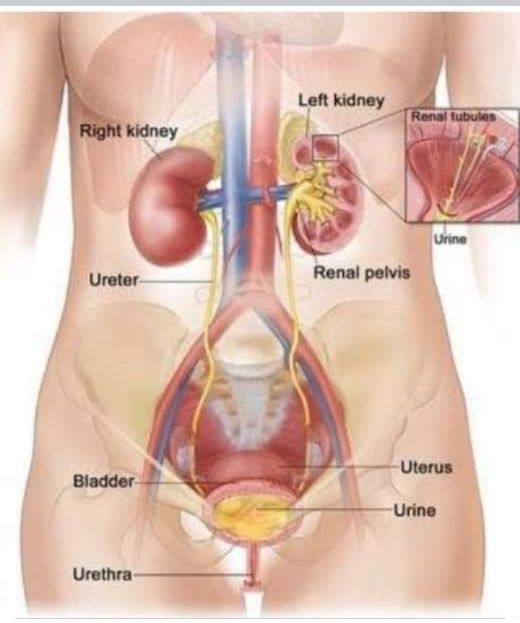Urinary Tract Infections(UTI) In Women!
A urinary tract infection (UTI) is an infection in any part of the urinary system — kidneys, ureters, bladder and urethra. Most infections involve the lower urinary tract — the bladder and the urethra.
Women are at greater risk of developing a UTI than are men because of more proximity of urethra to anus and very small size of urethra. If infection is upto bladder only, pain while urination is there which is annoying. However, more complications can occur if a UTI spreads to kidneys.
UTIs are given different names depending on where they occur. For example:
- A bladder infection is called: cystitis.
- A urethra infection is called: urethritis.
- A kidney infection is called: pyelonephritis.
Causes:
The following factors can increase the chances of developing a UTI:
- Diabetes.
- Poor personal hygiene.
- Problems emptying the bladder completely. May occur even when you are in a hurry and do not completely empty the bladder.
- Urinary catheter.
- Bowel incontinence.
- The blocked flow of urine even during travelling, the urine is not passed for some hours.
- Kidney stones.
- Some form of contraception.
- Pregnancy.
- Menopause.
- Procedures involving the urinary tract
- Suppressed immune system.
- Use of spermicides and tampons.
- Heavy bleeding per vagina.
- Heavy use of antibiotics, which can disrupt the natural flora of the bowel and urinary tract.
Diagnosis
- Immobility for a longer period.
- Sexual intercourse esp. More frequent, intense, and with multiple or new partners.
Diagnosis:
Usually symptoms are the ist step to diagnosis.
- Blood CBC shows infections.
- Urine complete with microscopic examination shows pus cells, casts, epithelial cells, crystals etc.
- Ultrasound scan for stones or pelvic inflammatory dis. That may lead to UTI.
Symptoms of UTI:
These are:
1. A burning feeling when passing urine.
2. A frequent or intense urge to pass urine, even though little comes out when comes it may be cloudy, dark, bloody, or strange-smelling.
3. There is a feeling of tiredness or shaky feeling.
4. Fever or chills (a sign that the infection may have reached kidneys)
5. Pain or pressure in the back or lower abdomen.
6. There may be burning in abdomen.
7. In females, there may be pelvic pain.
If it occur during pregnancy, prompt treatment is required as it may prove harmful to mother and developing foetus.
Prevention:
Everyone can take the following steps to help prevent UTIs:
- Drink six to eight glasses of water daily.
- Don’t hold urine for long periods of time.
- Talk to your doctor about managing any urinary incontinence or difficulties fully emptying your bladder.
Homeopathic treatment:
Remedies that are frequently used for UTIs:
1. Apis: severe burning and stinging pain in the urethra before, during, and after urination with a sensation of swelling in the urethra; violent urging to urinate, but must strain to pass urine, and it come out in only tiny amounts; abdomen sensitive to slightest touch; burning and stinging worse from heat and at night and better from cold.
2. Berberis: pains during or after urination; cutting, or shooting pains from the bladder to the urethra or from the urethra to the pelvis, thighs, or back; pains worse from motion; pain in kidneys or ureters (tubes from kidneys to bladder) that worsen from pressure, motion, or jarring.
3. Cantharis: most commonly used remedy for UTIs; frequent strong need to urinate, with much burning during urination; urgent need to empty bladder, and may lose urine even while rushing to the toilet; urine passes in small amounts; may feel urging just after or even during urination; tremendous burning, cutting, or stabbing pains in urethra and bladder before, during, and after urination, or whenever the urge to urinate is felt; restless, frantic with severe pain; sexual desire may be increased.
4. Mercurius: burning, uncontrollable urge to urinate; dark urine passing in small amounts; burning pain worse when patient is not urinating; burning may also be severe just before, when beginning or at end of urination; worse at night.
5. Nux vomica: burning or pressing pain in bladder during urination, pain in urethra before or during urination, sometimes with a strong urge to move bowels; needle-like pains in urethra extending toward bladder; may occur after excesses in eating, alcohol, coffee, or drugs.
6. Pulsatilla: pain not as intense as with cantharis or apis, but has significant smarting and burning; worse lying on back; urine may pass in dribbles, and maybe involuntary at slightest provocation (cough, sneeze, laugh, surprise).
7. Sarsaparilla: the most severe pain in the urethra is at the end of urination; pain may not be burning; pay needs to stand to urinate freely.
In homoeopathy these medicines are selected according to case taking.




+1.svg)
